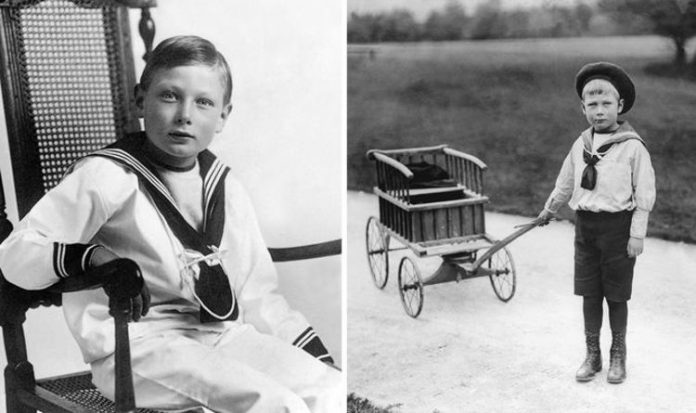In The Crown season four, Princess Margaret discovers that the family hid away their cousins Nerissa and Katherine Bowes-Lyon ‒ daughters of the Queen Mother’s brother ‒ due to their mental disabilities. The sisters were placed in a hospital in 1941 and later declared dead. Upon finding out they are still alive, Margaret is furious with her mother for what she calls “wicked, cold-hearted and cruel” actions in hiding the sisters away.
The Queen Mother explains it was done so no one would “question the integrity of the bloodline”.
She says: “There have been enough examples on the Windsor side alone for people to worry about: King George III… Prince John, your uncle.
“You add the Bowes-Lyon illness to that, the danger is it becomes untenable.”
Prince John was the youngest child of King George V and the younger brother of King Edward VIII ‒ later the Duke of Windsor ‒ and King George VI.
READ MORE: Queen’s disabled cousins ‘never visited by Royal Family’

Queen Elizabeth II’s uncle, Prince John (Image: GETTY)

Princess Margaret is played by Helena Bonham Carter in The Crown (Image: Netflix)
John, born in 1905, spent his early life in Sandringham with his five siblings and was nicknamed Johnnie.
When he was four it was discovered he suffered with epilepsy and showed signs of a disability, probably autism.
However, this was not disclosed to the public until after his tragic death aged just 13 in 1919.
He did not attend his father’s coronation in June 1911, because it was considered too risky for his health.

Katherine and Nerissa Bowes-Lyon feature in The Crown season four (Image: Netflix)
However, critics accused the family of hiding him because he was not deemed “presentable to the outside world”.
During his time at Sandringham, John exhibited repetitive behaviours and insubordination and it was even said he “simply didn’t understand he needed to behave”.
Nevertheless, he frequently appeared in public until he was around 11 years old.
However, he never attended school and after the outbreak of World War 1 rarely saw his parents, who were on official duties, or his siblings, who were either at boarding school or in the military.
DON’T MISS
Queen’s blunt Diana remark about hands-on mothering [REVEALED]
Meghan and Harry ‘made it about themselves’ on Remembrance Day [EXPERT]
Princess Diana was told she was ‘wasting food’ during bulimia battle [INSIGHT]

Prince John (bottom left) with his brothers including the future George VI (top left) and sister (Image: GETTY)
John gradually disappeared from the public eye and no official portraits of him were commissioned after 1913, when he was just eight.
In 1916, his health started deteriorating rapidly, with his seizures becoming more frequent and severe.
He was sent to live at Wood Farm with his governess “Lala” Bill away from the public eye, a house on the Sandringham Estate which is now used as Prince Philip’s primary residence.
With a lack of educational progress, the last of his tutors were dismissed and his formal education ended.
Physicians warned he may not reach adulthood.
At Wood Farm, John was remembered as a tall and muscular figure, but only ever seen at a distance and escorted by his retainers.
He was cared for by his governess and befriended local children, whom his mother Queen Mary gathered to be playmates.
However, as his seizures intensified, his governess became wary of him seeing other people.

Prince John sadly did not live past 13 years old (Image: GETTY)
She wrote: “We [dared] not let him be with his brothers and sister because it upsets them so much, with the attacks getting so bad and coming so often.”
Biograher Denis Judd claimed John’s “seclusion and ‘abnormality’ must have been disturbing to his brothers and sister” as he had been a “friendly, outgoing little boy, much loved by his brothers and sister, a sort of mascot for the family”.
He spent Christmas Day 1918 with his family at Sandringham House, but was driven back to Wood Farm at night.
Then, on January 18, 1919, he suffered a severe seizure and died in his sleep.

Prince John as a baby being held by Queen Mary and surrounded by his siblings and father (Image: GETTY)
Only then did the family tell the public about John’s illness, with a January 20 article in the Daily Mirror making the first public mention of his epilepsy.
John’s seclusion during his life has sometimes been brought forward as evidence of the inhumanity of the Royal Family.
However, he was a very visible member of the Royal Family until he was 11, when his condition became too severe to continue.
What’s more, records indicate that, in many ways, he was actually treated more favourably by his parents than his siblings.
Nevertheless, Prince John’s name is often lost in history and not many people alive today are aware he even existed.







